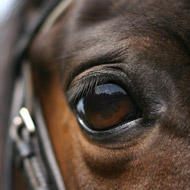
Research suggests owners struggle to recognise laminitis
A new study of horse owners has revealed that around 50 per cent were not able to recognise laminitis in their horses.
The research formed part of the CARE study by the Animal Health Trust and the Royal Veterinary College. CARE is a web-based equine cohort study that aims to find out how common laminitis is and which lifestyle factors contribute to it.
In one aspect of the ongoing study, researchers looked at the level of agreement between vets and owners about whether a horse had laminitis.
Using a number of clinically diagnosed laminitis cases reported by veterinary practices, they found that in around half of the cases, horse owners had not suspected laminitis.
"Equine laminitis is ranked as one of the top health concerns by both owners and vets," said PhD student Dee Pollard, who is leading the study. "Most horse owners will have either had experience of laminitis themselves or will know of someone who has. However, it is a notoriously complex disease and diagnosis is not always straightforward."
There are no clinical signs that are seen in every case and the condition can often masquerade as another problem, such as colic or abscess.
"This makes it even more vital to raise awareness about the disease, to ensure earlier detection, and to support research that helps find out how we can best prevent it developing in the first place," Dee added.
The CARE study works by recruiting a large number of members who will contribute regular information over time. Known as a 'cohort study', this method has been used extensively in human medicine and has led to important findings that link lifestyle factors to certain diseases.
So far, the project has more than 1,500 members but it needs another 1,000. Dee urged horse owners to get involved, calling for a collaborative effort from owners, professionals and researchers to raise awareness and, in time, to allow for easier early recognition of laminitis.
For more information, visit www.careaboutlaminitis.org.uk



 The latest
The latest